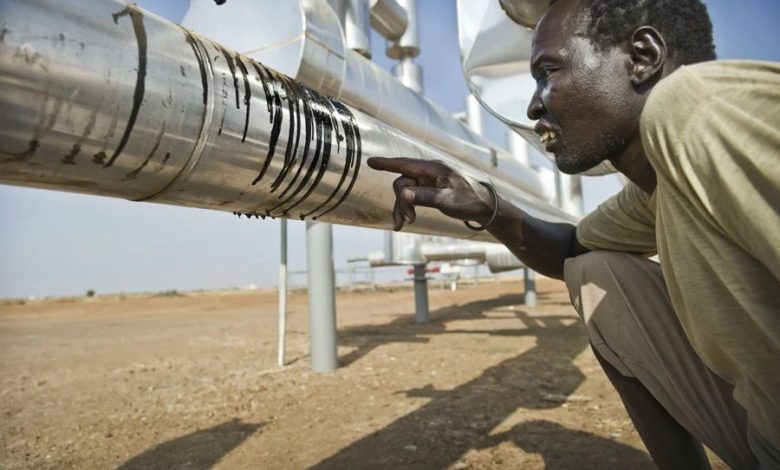Economic
Resumption of Southern Oil Production: Reality Defeats Ideals

Report by Rehab Abdullah
Arrangements are being made at a high pace to resume the oil flow from South Sudan after a hiatus of more than seven months. This is evident from the visits of delegations from South Sudan and inspections of oil production sites in safe areas.
Arrangements and Meetings:
Last week, a delegation from the South Sudanese government, led by the Undersecretary of the Ministry of Petroleum, Dr. Chol Deng Thon, visited Port Sudan to meet several officials and discuss resuming oil production. The delegation met with the Deputy Chairman of the Sovereign Council, Malik Agar.
The Minister of Energy and Oil, Dr. Mohieddin Al-Naeem, stated that the meeting discussed ongoing preparations to resume the flow of South Sudan’s oil, which had stopped for over seven months, affecting both the people of South Sudan and Sudan due to the rebel militia’s aggression. The parties agreed on necessary preparations for the main pipeline, with plans to hold a workshop involving technical experts from both countries to facilitate the resumption of oil flow.
Governmental Commitments:
The Chairman of the Sovereign Council, the Commander-in-Chief of the Armed Forces, General Abdel Fattah Al-Burhan, directed the relevant authorities to address all obstacles hindering the flow of South Sudanese oil through Sudanese territory.
Start of Oil Flow:
South Sudan’s security advisor to the president, Tut Gatluak, stressed that oil is a priority for South Sudan. He confirmed that the flow has already started from Jabalain and is passing through Sudanese territory to Bashair Port. He mentioned that the meeting addressed the issues impacting the flow of oil and confirmed South Sudan’s readiness to implement the agreed-upon steps with Sudan to ensure a steady flow of oil via Bashair. Gatluak stated that his visit to Sudan, instructed by President Salva Kiir, aims to follow up on all oil-related matters. He highlighted the importance of oil as a lifeline for citizens of both nations.
The Sudanese Minister of Energy and Oil, Dr. Mohieddin Naeem Mohamed, also confirmed Sudan’s readiness to transport South Sudanese oil from the fields to the world via Bashair Port in Port Sudan. He noted that oil serves as a crucial link between the two countries, underscoring strong cooperation between the two ministries and companies involved in the pipeline.
Gatluak emphasized the mutual interest in oil production due to the benefits for both populations, revealing that South Sudanese citizens faced significant hardships due to the halt in oil exports. He reassured that all obstacles had been resolved, and the pipeline is now ready.
Pipeline Disruptions:
The Director General of Bashair Pipeline Company, Engineer Ibrahim Adam, explained the disruptions in oil flow due to security and natural challenges, including floods, which delayed maintenance efforts on the pipeline.
Accusations Against South Sudanese Militias:
The former oil minister, Engineer Ishaq Jama’a, accused the rebel Rapid Support Forces (RSF) and their allies of causing the suspension of the “Dar” oil flow, Sudan’s only active oil pipeline. He highlighted that the main collection and pumping stations are in areas under RSF control, affecting the flow to Port Sudan.
Direct Economic Impact:
Economist Dr. Haitham Fathi noted that the conflict has impacted both economies, reducing oil exports from South Sudan from 350,000 to 150,000 barrels per day, affecting Sudan’s annual revenue of about $300 million. The damaged pipeline is Africa’s longest and cost approximately $1.8 billion to build. Additional risks include potential damage to other pipelines, complicating agreements on oil transportation.
Pipeline Rupture:
In March, Dar Petroleum announced a force majeure concerning South Sudan’s crude oil due to pipeline damage in Khartoum.



